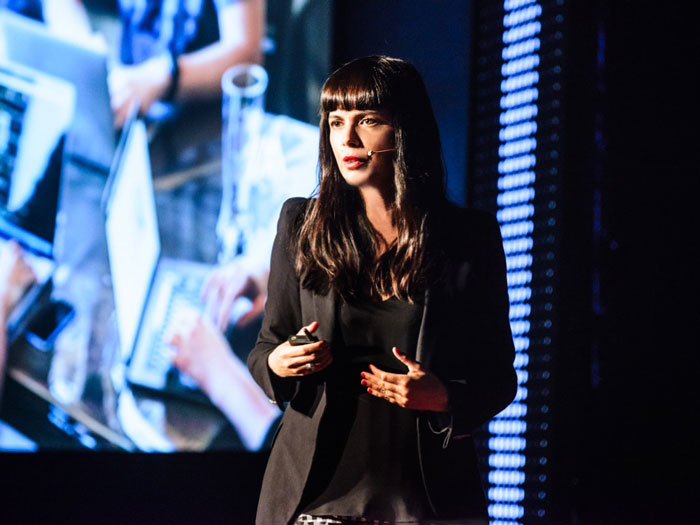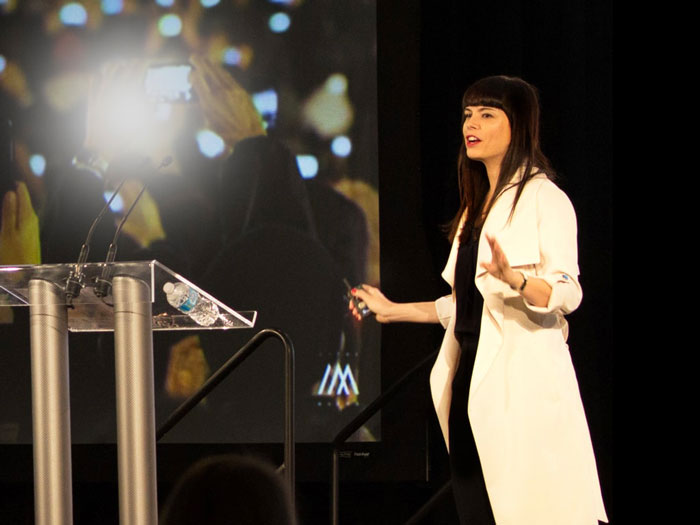
‘Innovative thinking is key to future-proofing your business’
 Lital Marom has founded four companies, including the innovation consulting firm UNFOLD (Photograph provided)
Lital Marom has founded four companies, including the innovation consulting firm UNFOLD (Photograph provided)
At a time when the entire working world is undergoing major shifts owing to technology and other factors, it’s never been more important for the accounting profession to prepare for an evolving future.
As a thought leader on innovation, digital transformation, the future of work and more, Lital Marom has the ideal skillset to help CPAs and the organizations they serve to embrace that future right now.
Marom’s track record speaks for itself: after building computer systems for companies in Israel and Europe, she advanced to lead global sales and strategy for Fortune 100 teams across three continents. Since then, she’s founded four companies, including the innovation consulting firm UNFOLD, and the leadership and development organization The Academy of Tomorrow.
At The ONE national conference in September, Marom will look at the patterns that underpin successful, digitally transformed businesses, and how leaders can apply these patterns to drive growth in their own organizations.
CPA Canada recently spoke to Marom about some of the principles that guide her thinking.
CPA CANADA: You speak a lot about future-proofing business. How can finance professionals harness tools like AI and machine learning to stay relevant in this changing technological landscape?
Lital Marom (LM): As business landscapes evolve, finance professionals must harness tools like artificial intelligence and machine learning to future-proof their roles and maintain relevancy. AI and machine learning have transformative potential—they’re not just tools but catalysts for reshaping business practices.
Finance professionals grapple with extensive data daily. Here, AI and machine learning prove invaluable, analyzing vast data troves rapidly, unveiling critical insights, predicting trends and enhancing decision-making capabilities. This increases time for strategic tasks, driving growth and innovation.
A game-changer is AI’s role in fraud detection. By identifying patterns and anomalies, AI enhances the accuracy and speed of fraud detection, providing unprecedented security levels in finance.
Machine learning, part of the broader AI field, refines predictions over time. It could, for instance, foresee market shifts, enabling forward-thinking strategies. Also, AI’s automation capabilities streamline repetitive tasks such as invoicing or report generation, reducing errors and saving time.
As finance professionals, adopting these technologies transcends staying relevant—it’s a chance to drive strategic valueand redefine finance’s role within the business. This adoption demands a learning and adaptable mindset, ready to harness AI to its full potential. Embrace this approach, and you’re not just future-proofing your business—you’re charting a course for transformative growth.
CPA CANADA: What’s the difference between exponential and linear thinking, and how can exponential thinking help accountants and business professionals grow and transform their careers and businesses?
LM: Exponential versus linear thinking—these two paradigms represent vastly different approaches to growth and progress. Linear thinking is grounded in the familiar: it sees change as constant, gradual and predictable. It’s the concept of taking one step at a time, moving forward at a steady pace. However, in a world rapidly reshaped by technology and innovation, this mindset can restrict possibilities and block growth.
Enter exponential thinking: this mindset sees growth not as a slow, steady climb but as a series of leaps and bounds. It acknowledges the massive, rapidly compounding changes made possible by technology.
For accountants and business professionals, adopting an exponential mindset can unlock transformative potential. Emerging technologies such as artificial intelligence, machine learning and blockchain are not merely tools to increase efficiency but catalysts to redefine what’s possible.
Imagine an accountant powered by AI—automation takes care of mundane, repetitive tasks, leaving the professional free to engage in strategic analysis, provide business insights, and play a critical role in decision-making. They transform from a number-cruncher to a strategic advisor, exponentially enhancing their value.
 Lital Marom speaking to an audience (Photograph provided)
Lital Marom speaking to an audience (Photograph provided)
CPA CANADA: This year’s theme of The ONE, “Evolution of the Enterprise,” reflects the intersection of economic competitiveness, digital transformation, and social and environmental consciousness. What are the questions finance professionals need to ask themselves that will transform their businesses for this new era?
LM: In this new era, finance professionals must ask transformative questions:
- Digital savvy: Are we leveraging digital technologies like AI and machine learning to streamline processes, enhance decision-making, and increase competitiveness?
- Sustainability: How can we embed sustainability in our financial strategies? Are we considering the environmental and social impact of our decisions, aligning with global ESG (Environmental, Social, Governance) standards?
- Innovation: Are we fostering a culture of innovation that encourages the exploration of new business models, digital tools, and processes?
- Resilience: How resilient is our business model to disruptions such as market shifts or new regulations? How can we leverage digital technologies to enhance our resilience?
- Talent development: Are we investing in upskilling our workforce to leverage new technologies effectively? How can we nurture a culture of lifelong learning, adaptability and innovation?
- Data ethics: As we employ more data-centric strategies, are we considering the ethical implications? Are we responsibly handling data while respecting privacy rights?
CPA CANADA: When you talk about the future of work, you discuss a need to be agile and adaptable. Are these learnable skills?
LM: Absolutely, agility and adaptability are indeed learnable skills. Here’s how to cultivate them:
Promote learning: Encourage continuous professional development. Provide access to resources and training that equip your team with new skills and knowledge. This includes not just formal training but also ‘learning by doing’. Provide access to resources and training that equip your team with new skills and knowledge but also create opportunities for the practical application of these skills in real work scenarios.
Cultivate a culture of creativity and exploration: By promoting an environment that encourages exploration and creative thinking, we allow for the natural emergence of innovation. This can be achieved by giving teams the freedom to experiment with new ideas and take calculated risks, even if they sometimes result in failure.
Cultivate inclusivity and diversity: Embracing diversity and inclusivity is more than just a matter of ethics; it’s a business strategy that can significantly contribute to an organization’s innovation. By inviting a diverse range of voices, experiences, and perspectives into the conversation, companies can unlock new viewpoints and solutions that might not have been visible from a more homogeneous perspective. This can lead to breakthroughs in problem-solving and business strategy. It’s also important to create a culture where all employees feel valued and included.
Champion and reward innovative thinking: Celebrating and rewarding innovative thinking is key to future-proofing your business. Recognize those who dare to think differently and provide unique solutions, even if their ideas don’t always lead to immediate success. Rewarding innovation encourages risk-taking and reinforces the message that creative problem-solving is valued within the organization. This can be done in a variety of ways—from formal recognition in performance evaluations to innovation awards to simply acknowledging innovative ideas in team meetings.
Embed learning in daily work: Encourage on-the-job learning. Give team members the opportunity to work on different projects and roles.
By cultivating a culture of learning and innovation, finance professionals and their organizations can stay ahead of the curve, ready to leverage opportunities in the rapidly changing technological landscape.
MORE LEARNING OPPORTUNITIES
Make sure to attend The ONE national conference in Halifax, September 12 and 13, where Lital Marom will be a keynote speaker. Focusing on “the evolution of the enterprise,” this year’s conference will offer sessions on everything from leadership in the age of climate change to attracting and retaining talent.